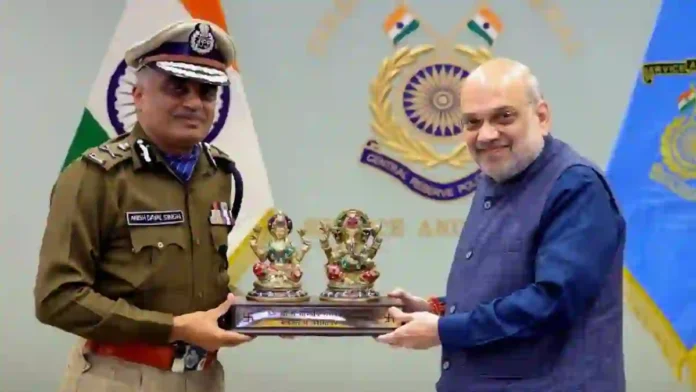Anish Dayal Singh, a retired Indian Police Service (IPS) officer from the 1988 batch of the Manipur cadre, has been appointed as the new Deputy National Security Adviser (DNSA) to Prime Minister Narendra Modi.
Born in 1964 in Prayagraj, Uttar Pradesh, Singh entered the IPS in 1988 and underwent his foundational training at the prestigious Sardar Vallabhbhai Patel National Police Academy in Hyderabad.
Over a distinguished career spanning more than three decades, Singh has served both in his cadre state and on key central deputations, building a reputation as a seasoned security professional with significant operational and administrative experience. His elevation to the position of Deputy NSA places him directly under the leadership of National Security Adviser Ajit Doval, signifying his importance in India’s national security architecture.
Singh’s career has been marked by leadership roles in multiple paramilitary and security institutions of the country. After serving in Manipur in the early years of his career, he was deputed to the Intelligence Bureau (IB) in the 2000s, where he contributed to vital internal security operations during a period of heightened insurgency challenges. His career trajectory later saw him rise to the position of Director General of the Indo-Tibetan Border Police (ITBP), a strategically significant force tasked with defending India’s 3,488-kilometre-long border with China.
His tenure at ITBP was instrumental in bolstering border security at a time of increasing geopolitical tensions along the Line of Actual Control (LAC). In December 2023, Singh was appointed Director General of the Central Reserve Police Force (CRPF), the world’s largest paramilitary institution, and he assumed charge officially from January 1, 2024.
Leading a force of over three lakh personnel in an organisation central to both internal security and national defence, Singh supervised operations that had a lasting strategic impact.
During his leadership at the CRPF, Singh steered the force through a crucial period in India’s security landscape, marked by the general elections of 2024 and the historic conduct of legislative assembly elections in Jammu and Kashmir. These elections, the first in the Union Territory since its reorganisation in 2019, were widely viewed as a critical test of security preparedness.
Under Singh’s stewardship, the CRPF ensured orderly and peaceful polling, reinforcing the government’s agenda of stabilising sensitive regions. Another hallmark of Singh’s tenure was his proactive role in anti-Naxal operations. He oversaw the establishment of more than 36 forward operating bases in Left-Wing Extremism (LWE) affected regions, significantly enhancing the CRPF’s ability to launch quick-response actions and extend its operational reach.
Read- VTOL Aviation Develops VLM_X8 Portable VTOL Loitering Munition For Kamikaze Missions
Read- Hitting A Bullet With A Bullet: India’s Sudarshan Chakra Sky Shield
Additionally, he operationalised four new battalions, introducing over 4,000 additional personnel into counter-Naxal duties in Chhattisgarh, the epicentre of the insurgency. These measures played a pivotal role in weakening the operational capacity of Naxal groups and expanding security coverage into remote areas.
Among Singh’s most notable organisational reforms as CRPF chief was a comprehensive realignment of more than 130 battalions—a long-pending initiative approved by the Union Home Ministry after nearly eight years of review. This restructuring sought to bring uniformity and efficiency to CRPF operations by reducing the average distance between battalions and their group centres (from 1,200 kilometres to just 500 kilometres), thereby significantly easing logistical burdens and improving administrative response times.
The realignment was also designed to facilitate better family time for Jawans, thus directly addressing issues of welfare and morale in the force. To enhance communication across the hierarchy and gain grass roots insights, Singh initiated the ‘Samvaad’ programme—dedicated sessions of dialogue with company commanders and assistant commandants.
This innovative step gave junior officers a platform to voice on-ground operational challenges and requirements directly to the leadership, fostering a culture of inclusiveness and feedback-based decision-making within the paramilitary.
Anish Dayal Singh’s career reflects a balance of strategic foresight and hands-on operational leadership, qualities that will prove invaluable in his new role as Deputy NSA. His experience in counter-insurgency operations, border management with China, intelligence handling, and paramilitary reforms provide him with a comprehensive understanding of India’s multifaceted security challenges.
As Deputy NSA, Singh is expected to bring his deep institutional knowledge and operational rigour to the high-level policymaking and coordination functions critical to India’s national security.
Reporting directly to NSA Ajit Doval, Singh’s role will likely involve oversight of key internal security strategies, management of paramilitary inputs into national security planning, and coordination across intelligence, defence, and security arms of the government.
Given his proven track record of modernising paramilitary forces and fostering operational efficiency, his appointment is seen as a continuation of the government’s strategy to strengthen national security leadership through experienced officers with credibility on the ground as well as at the policy level.
Anish Dayal Singh’s journey from Prayagraj to the post of Deputy National Security Adviser has been defined by decades of service to India’s internal security and border defence.
His leadership of the CRPF and ITBP—two vital pillars of India’s paramilitary establishment—along with his background in intelligence and counter-insurgency, positions him as a pivotal figure in shaping India’s national security strategy during a period of both external and internal challenges.
His appointment underscores the government’s emphasis on continuity, professionalism, and operational acumen at the very top levels of the national security establishment.
Based On PTI Report
Agencies




